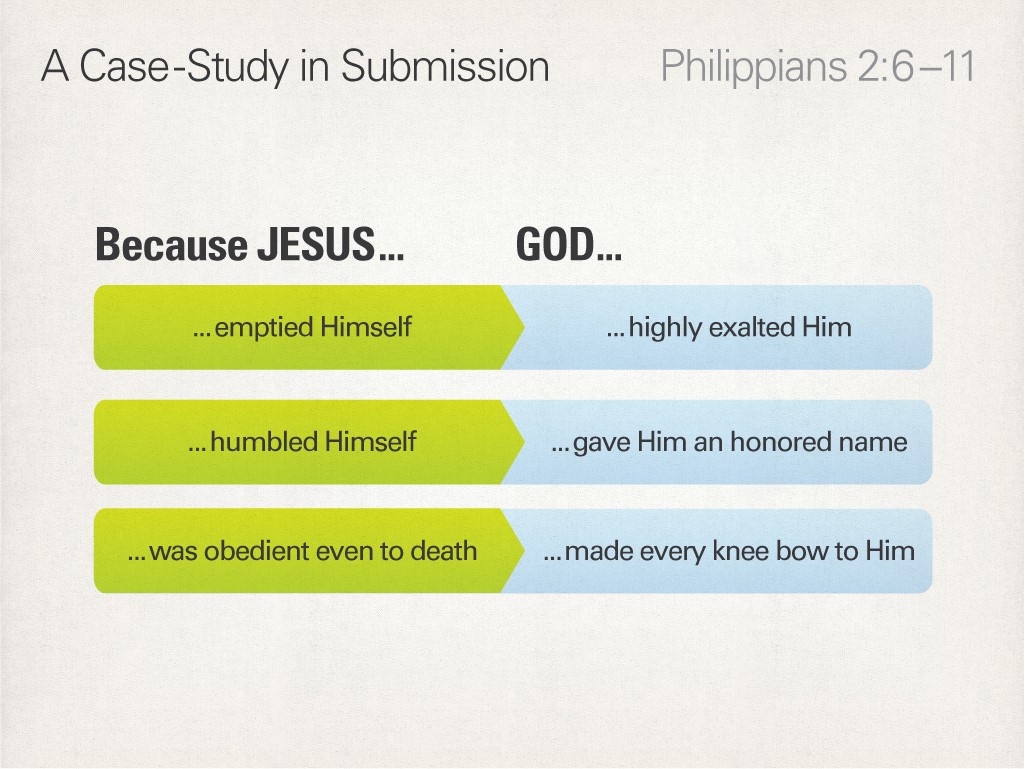
Runge, Steven E. High Definition Commentary: Philippians. Bellingham, WA: Logos Bible Software, 2011.
Well, it’s getting to be the end of the semester, and school + life = craziness! While trying to balance so many things, I find myself unable to sit down and write some blog posts for you all to enjoy. I did however recently write a paper for my Greek Exegesis class. As it turns out, I didn’t write complete heresy, so for the next week or so I’ll be dividing excerpts of that paper up into some posts for you all to read. I hope you get something from it! The paper itself was an exegetical paper on Philippians 2:12-13.
I. Translation
12 Ὥστε, ἀγαπητοί μου, καθὼς πάντοτε ὑπηκούσατε, μὴ ὡς[1] ἐν τῇ παρουσίᾳ μου μόνον ἀλλὰ νῦν πολλῷ μᾶλλον ἐν τῇ ἀπουσίᾳ μου, μετὰ φόβου καὶ τρόμου τὴν ἑαυτῶν σωτηρίαν κατεργάζεσθε· 13 θεὸς γάρ ἐστιν ὁ ἐνεργῶν ἐν ὑμῖν καὶ τὸ θέλειν καὶ τὸ ἐνεργεῖν ὑπὲρ τῆς εὐδοκίας.
12 Therefore, my beloved, just as you always obeyed, not as[2] in my presence only but now much more in my absence, with fear and trembling workout your own salvation. 13 For God is the one working in you, both to will and to work for his good pleasure.
II. Survey of the Text
Paul’s letter to the Philippians is one that is marked by endearing words of cheer, joy and rejoicing. It has many of the characteristics of a “letter of friendship”, and it is clear Paul has a very close relationship with this church (Fee, 13). Because of the language and tone associated with the letter, readers often mistakenly believe the Philippian church is one without struggles or problems taking place within the church. However, as exegetes and students of the word we must ask ourselves why Paul felt it was important to use this language and structure in the first place. Upon a closer study of the text, it is clear that there are two underlying situations as the cause for this letter; hardships and suffering within the church, as well as enemies and external opposition to the church. It is Paul’s primary goal to provide exhortations against these trials all while having joy in Christ.
Paul immediately begins his letter with an expression of thankfulness toward the Philippian church. It is clear the church is special to Paul, as it was not only his first plant but also the only one to offer up support for his ministry (4:15). It was important for Paul to establish this connection and relationship between himself and the church, as he continues the letter by summarizing his current imprisonment. When the church might be expecting to hear of Paul’s sorrow, he instead speaks of his joy in Christ and the advance of the gospel that has taken place because of his time in prison. Not only do we see Paul using himself as an example in these verses, but we also get our first glimpse of the external opposition facing Paul and the Philippian church (vs. 1:15, 17).
This summary of his imprisonment is Paul’s way of showing an example of what it means to have joy during suffering. He encourages the church to stand firm in one spirit, to be striving side by side for the faith of the gospel, and not to be frightened by their opponents. The important thing to realize about this language is that in order to stand firm, there must be something to stand firm against. It could be debated to the degree to which opposition and weak faith is impacting the congregation, but it is clear in these verses (1:27-30) that the church is facing opposition of some kind. The church itself is engaged in the same conflict as Paul, which is a gift from Christ (vs. 29).
As if Paul’s example of joy during suffering were not a big enough statement, he continues to use Christ’s example of humility to the point of death as means of encouragement and a basis for sanctification in the church (vs. 2:1-11). As it was Christ who humbled himself to the point of death on a tree, counting us as more significant than himself, so too then should we count others more significant than ourselves (these verses are especially relevant as they immediately precede verses 12 and 13, which will continue to be explored in remainder of this paper). With Paul’s preceding example and exhortation to stand firm in conflict (vs. 30), as well as Christ’s example as a means of showing how to treat one another, it is clear that some sort of internal doubt (possibly departures from the faith, see vs. 3:18) and/or external opposition are facing this church.
As the letter continues, it becomes more evident that polemical charges are being placed upon false teacher and opposition facing the church. While not as polemical as the Judaizers facing Galatia or the false teachers Timothy would later face in Ephesus, it is clear by such language as “dogs”, “evildoers” (3:2) and “enemies of the cross of Christ” (3:18) that this group (or groups) were causing some serious issues in Philippi. They appear to place confidence in the flesh – that is worldly status and esteem – things Paul calls “rubbish”.
Upon a closer look at Philippians, we gain a backdrop for how we should read Paul’s numerous exhortations to joy and rejoicing in this letter. It is evident that there is some form of doubt or temptation from within the church, as well as an external group of people opposing the congregation. Despite these circumstances, Paul provides himself – and more importantly Christ Jesus – as examples for rejoicing during suffering. Indeed, Paul commands the church to “Rejoice in the Lord always” (vs. 4:4)!
III. Historical, Literary, Redemptive-Historical Contexts
As is the task of any good exegete, it is necessary for us to take into consideration the historical elements which bear weight on this letter, elements of the literature which might impact our interpretation, as well as the greater redemptive-historical impacts this letter makes on the rest of the Scriptures.
The relationship between Paul and the church at Philippi has significant impact on this letter. While we might think that Philippi was merely another church plant, it is clear even from the text in verses 1:5 and 4:15 that Paul and the church have a close relationship. Moises Silva astutely reconstructs the events of Paul’s ministry, showing that Philippi was Paul’s first plant as well as the first church to faithfully and continually support his ministry (Silva, 2). Indeed, even when the church was unable to help Paul due to their own circumstances, they felt a responsibility to provide assistance to him.
In addition to the relationship Paul has with the church, it is important for us to see the relationship his co-laborers Epaphroditus and Timothy had with the church as well (verses 2:19-30). This not only explains the predicament Paul mentions in chapter 2, but also shows us that Paul’s ministry had multiple occasions and trips to the church at Philippi, either through Epaphroditus, Timothy or Paul himself (Silva, 4, 5-7). Studying the relationship Paul’s ministry had with the church at Philippi serves to put into context the overflowing love and joy Paul has for this church.
While many scholars debate the importance of where this letter was written from, I remain unconvinced that this is significant to our understanding of the letter (I do however agree with Silva and Fee’s apparent dismissal of theories other than the Rome origin). What I believe is more important to our comprehension of Philippians is the categorization of the opposition facing Paul and the church at Philippi. For brevity’s sake I will merely make mention of verse 3:2 as reason to believe that there was a hyper-Jewish Christian sect arising near Philippi. It is ambiguous whether this is the same group taking advantage of Paul’s imprisonment in chapter 1 (Silva, 9).
The style of literature this letter takes on is also important for us to consider. Gordon Fee tells us that this is a letter of two different kinds; a “letter of friendship” and a letter of “moral exhortation” (Fee, 13-20). We are able to classify this letter as such using even ancient literature that have been passed down from this time period, those of Demetrius and Libanius. Fee categorizes the letter as “friendly” because it contains common elements of the friendly letter – the separation between friends (1:27, 2:12), concern for the affairs of both sender and recipient (1:12, 27, 2:19, 34), and that the recipient “does well” to look after the needs of the sender (4:14) (Fee, 13-14). We also see elements of moral exhortation, which are that the writer is the recipients friend and/or moral superior, and that the writer aims and persuasion or dissuasion. Philippians contains large hortatory sections which fit into these descriptions, namely 1:27-2:18 and 3:1-4:3. Considering Paul’s “all of us…should” language, one of the aims of Paul’s letter does indeed seem to be a persuasion towards a certain kind of behavior (Fee, 18-19).
It is also worthwhile for us to study Paul’s use of the Old Testament in this letter. While Paul would normally issue his argument from an extensive use and quotation of the Old Testament, these qualities are missing from this letter (Fee, 22). What we see instead is sort of an inter-weaving of Old Testament into Paul’s written context, otherwise known as “intertextuality”. This style of writing assumes that the hearers will know the original text intimately and that they will understand how it is newly being used. Fee argues that this type of usage is not the type of polemics we might find in Galatians or 1 Timothy, but instead is a writing mutuality and common ground (Fee, 23). An example of this intertextuality can be seen in verse 2:12 when Paul instructs believers to work out their salvation with “fear and trembling”. This language is exclusively used by Paul in the New Testament, and harkens back to language from the Old Testament. It primarily is identified with the fear pagans felt before God because of the wonders he worked for His people (Isaiah 19:16, Deuteronomy 2:25) (Fee, 105).
Finally we must examine the themes of Philippians and how they fit into the entirety of redemptive history. As it has already been addressed, the theme of joy amidst suffering and trial is one of, if not the primary theme of this letter. It is important for us to consider this text in light of a world post-crucifixion, where a church has already been established and is thriving. As a body of believers, what then should the expectation be for the Christian life? Paul could not be clearer than he is in 1:29, “For it has been granted to you that for the sake of Christ you should not only believe in him but also suffer for his sake[3]”. As he will later say in 3:15, “Let those of us who are mature think this way”. The expectation for a believer in Christ following his death and resurrection should be to suffer for his sake, yet in the midst of this to “Rejoice in the Lord always”. This theme in Philippians is especially important for us to grasp onto as servants of God’s redemptive plan as we take his gospel to all peoples.
[1] The UBS Critical apparatus notes that ὡς may or may not be in the original. However, in Bruce Metzgers Textual Commentary on the Greek New Testament he concludes that its absence from certain documents is likely accidental, and the presence of the word in p46 as well as in the Alexandrian and Western texts gives strong to support to it being in the original document. I see no reason to disagree with his analysis.
[2] See note above.
[3] The Holy Bible: English Standard Version (Wheaton: Standard Bible Society, 2001), Php 1:29.
Well, finishing this little mini-series took a lot longer than expected. Needless to say that getting engaged, work, school and life are enough to keep me away from writing!
I’ve previously written two entries about the study of Biblical languages, part 1 and part 2. In the first entry I talked about why it is important for ministry leaders, particularly pastors, to have a working knowledge of the original text. In the second entry, I focused mainly on some small but common examples of how to defend the text against common attacks. In this last entry of this series, I am going to discuss a few examples of how the original text can greatly enhance teaching from a given text.
It is rarely the case that a reading of the original language will significantly alter the message of the translation. That should be of great comfort to many, as it shows that our English translations (and others) are mostly accurate concerning the original text. What we do often find, however, is that the message can be significantly enhanced by really understanding the language of the author.
Below I have listed a few examples that I will do my best to explain. I would like to again remind the reader that I am in no way claiming to be an expert on this subject, as I am barely scratching the surface myself. I do however love to share what I am learning with others, and I hope in some way these little examples are enriching to you.
Example #1: Understanding the Original Word
This little diddy was something I discovered in my studies of 1 Timothy a couple of weeks ago. As I was translating and studying 1 Timothy 2:1-6, I was curious at the following line: For there is one God, and there is one mediator between God and men, the man Christ Jesus, who gave himself as a ransom for all, which is the testimony given at the proper time (1 Ti 2:5–6, ESV). My attention was drawn to the word ransom, ἀντίλυτρον in the Greek. Recognizing this as a compound word, I looked up λυτρον in the lexicon to find that λυτρον by itself meant “ransom”. So why the need to compound ἀντί ? Turning to my handy Daniel Wallace grammar to see what he had to say about this, indeed our little preposition ἀντί provides great emphasis to this passage. As it turns out, ἀντί carries the meaning of “exchange”, “substitution” or “in place of”.
Now the passage in the English already says “ransom for all”, so the idea of Christ paying our penalty is already at work here. However, taking into consideration the full word ἀντίλυτρον, we can now really see a substitutionary ransom is what Paul really had in mind here. Paul really wants to get the message across to his audience that Christ’s death was in place of sinners. How sweet this truth is!
Example #2: The Present Progressive
The book of 1 John is awesome because you need very little vocabulary to translate it. It is so repetitive that by the end of the book you feel like an absolute pro who could translate any book in the New Testament. If only this was the case…
1 John 3:9 presents us with an interesting little passage. It reads: No one born of God makes a practice of sinning, for God’s seed abides in him, and he cannot keep on sinning because he has been born of God ( 1 Jn 3:9, ESV). Now from what we know about the entirety of the New Testament, there can be no way this passage means that if you sin once you aren’t a Christian anymore. That isn’t how grace works. But don’t we sometimes think that? Maybe when we’re feeling low, having a week where we’ve really fallen into sin, we start thinking those thoughts don’t we? There are some preachers out there (albeit false ones) who want to lord over you by preaching a perfectionist message, maybe they’re right?
This is where our understanding of the present progressive tense comes into play. The present progressive tense is one that means it is an action that is occurring now and is continuing on into the future. When we read the verbs “makes a practice of” and “sinning”, what we’d find in the Greek language is this is in the present progressive tense. So what we’re talking about here is someone who sins now and continues habitually to practice that sin without remorse. While this is again understandable from our English translations, it is entirely possible for people to get caught up on verses like this.
**As I write example #3, I realize it is worth briefly mentioning Hebrews 2:17, …to make propitiation for the sins of the people (Heb 2:17b, ESV). It is interesting to note that the verb “to make propitiation”, ἱλάσκεσθαι, is also in the present progressive tense. What we can gather from this is that this passage is not referring to a single act of atonement on the cross, but a continual subsequent activity by which Christ continually applies the propitiatory power of His sacrifice (Vos, Redemptive History and Biblical Interpretation, 145). Since this could be an entirely separate post to examine this, for brevity’s sake I will end this note here.
Example #3: The Perfect Tense

The second temptation of Christ (Mt. 4:5–7). Relief, Cathedral of St. Lazarus, Autun, France, 12th century AD.
The perfect tense is a verb tense in the Greek language that is really hard to communicate in the English. The reason for this is the lengthy implications the perfect tense has. The perfect tense can simply be defined by an action that was completed in the past and has results or impact in the present time. An example of this idea would be like saying “I have freed him from jail”, with the present result being that he is still freed. Since it is hard to realize when such a tense is being read in our English translations, we often breeze right through the words without stopping and asking “Well what is the result that action had on present reality?”
The perfect tense is littered throughout the Greek text, and it often can greatly enhance ones message when properly understood. A great example of this can be seen in Hebrews 2:18, For because he himself has suffered when tempted, he is able to help those who are being tempted (Heb 2:18, ESV). The verb for “has suffered” is in the perfect tense, which tells us that Christ’s sufferings are something that happened in the past, but have a result in present reality. The sufferings and temptation that Christ has behind him, and still carries with him as a past experience, enables him to relate and know exactly to what weight and force we are struggling in our temptations.
This message brings such joy and comfort to my soul. The God of the Bible is such a drastically different God than any other man-made god throughout history – he understands what we are going through and sympathizes with us in our weaknesses. I know when I am feeling tempted and shamed in my sinful state that Christ hears me and sympathizes with me, knowing what I am going through.
Example #4: Word Order
Those silly Greeks didn’t quite understand proper word order yet (proper by my American English standards!), so ancient Greek writings can largely put the words in any order the author so chooses. One of the benefits of this is that the author can place certain words before others if he really wanted to provide an emphasis on a word or concept.
Philippians 2:13 has a really great example of this. The beginning of this verse reads, for it is God who works in you (Phil 2:13a, ESV). The Greek for this reads θεὸς γάρ ἐστιν ὁ ἐνεργῶν ἐν ὑμῖν, woodenly translated for God is the one working in you. What is interesting about this sentence fragment is the word order – under normal circumstances we would expect ὁ ἐνεργῶν (the one working) to have been the first two words in the construct, as it is the subject of this clause. However, what we find is that Paul chose to put θεὸς (God) first. This is important for us because it tells us that Paul really wanted to emphasize GOD as the one who works in us. That is the concept Paul wants us to take away, that it is not us who works for him but it is GOD who works in us. This is also especially important if we consider the previous verse, which has often led people to think Paul was teaching a works-based salvation. This is not the case, instead Paul is speaking of an obedience to God already working in us.
—–
Well, that concludes this short series on the importance of language studies. I hope these few examples were enriching to you in some way, and if you are not familiar with languages, you can begin to see how small things here and there can really begin to enhance the message of a passage when the original text is really studied.
Of course there are examples where varying translations can occur from the Greek that might have significant differences in the meaning of the passage (Philippians 2:13, substantive infinitives anyone?). However, I do not think examining such passages would be particularly fruitful at this time, but I may write about them in the future.
If you are familiar with languages, or have had some training in the past but have now neglected to keep up with your understanding of the languages, I hope this series was an encouragement and challenge for you to get your grammars and books back out. For people new to the idea of studying languages, I hope this series has given you an appreciation for the depth that can be found in language study.
When I began this series weeks ago, I set out to answer the question “Why study the original languages if we have modern translations?” Hopefully this served its purpose!
“Don’t judge me!”
“Christian’s aren’t supposed to judge!”
“Judge not, lest ye be judged!”
Do any of these sound familiar? The above sayings are a few common examples of all-too-often used statements from people who either reject the entirety of the Christian faith, or some of it’s key tenets. Just look at any public discussion – specifically online – where Christianity comes up, and such statements run rampant. But are these sayings accurate? Does Christianity, specifically Jesus himself teach that we aren’t to judge one another?
The truth is, everybody want’s Jesus on their side. We live in an age where the majority of the population is Biblically illiterate, and rather than investigate what they hear for themselves they trust the first thing they hear that already agrees with their beliefs. Those who hold to the belief that Jesus’ followers aren’t to judge anyone will often reference either John 8:7 (“Let him who is without sin among you be the first to throw a stone at her.”), or Matthew 7:1 (“Judge not, that you be not judged.”). From a plain reading, one might conclude that Jesus did in fact teach that his followers are not to make any judgment whatsoever. The Bible has a lot to say about judging one another – but since even non-Christians like to quote Jesus to make their point, let us look specifically at these verses in their appropriate contexts to see what Jesus really had to say about judging people.
The Terms
Before we continue, we need to define what it means to even judge someone or something. The classical view of “judgment”, that is the one that exists in the dictionaries and was the understanding in society up until the post-modern era, says this:
- to form an opinion about through careful weighing of evidence and testing of premises
- to determine or pronounce after inquiry and deliberation
- to hold as an opinion
- to form an opinion
Inc Merriam-Webster, Merriam-Webster’s Collegiate Dictionary., Eleventh ed. (Springfield, MA: Merriam-Webster, Inc., 2003).
By classical standards, to judge someone or something merely means to form an opinion about the object or person in question. Only in our post-modern context does this word carry a negative tone to it – where casting judgment is wrong if it offends someone, or disagrees with something they do or say. We like judgment when it makes us feel good – if we do well on something and we get complimented, we love judgment! However, when people don’t think we did something right or disagree with our actions, all of a sudden we hate judgment and we start yelling at people.
For the remainder of this article, I will be using the classical definition of judgment.
John 8
Let us dive deeper into the passage from John 8. The first key to examining any verse in the Bible is in what context does it fall. I can take any verse out of the Bible and make it say anything I want, the question is – is that what the verse meant in it’s original context?
Starting in verse 1 of chapter 8, Jesus is on his way to the temple. As he was teaching there, the scribes and the Pharisees (the legalistic teachers of the law who were always trying to undermine Jesus and eventually got him placed on the cross) bring a woman to him who was caught in adultery. In verse 4 they say to him “Teacher, this woman has been caught in the act of adultery. Now in the Law Moses commanded us to stone such women. So what do you say?”
I can only imagine the tension of this encounter. Every time the Pharisees encounter Jesus, they try to catch him in a trap and get him to contradict the law of Moses. It always amazes me to see how Jesus responds, truly showing the ignorance of us petty humans and how we always try to take control of everything. In verse 6, Jesus bends down and began to write with his finger in the ground (Nobody knows for sure what he wrote, as the passage does not say. For you Bible nerds out there, check out Jeremiah 17:13 for a pretty strong connection to say that Jesus may have been writing their names in the sand). As the Pharisees and scribes continue to speak, Jesus responds with the classic go-to line “Let him who is without sin among you be the first to throw a stone at her.”
John’s gospel goes on to say that when they heard what Jesus said, they began to walk away one by one. Left with merely the woman before him, this encounter concludes with Jesus telling the woman “Neither do I condemn you; go, and from now on sin no more.”
Before we draw conclusions from what this passage means, let’s examine the passage from Matthew as well. With both stories in view, our conclusions will make much more sense.
Matthew 7
This passage in Matthew begins with our verse in question right away. Starting in verse 1, “Judge not, that you be not judged…” As we said above, it is absolutely imperative that we take this verse in context and read what the rest of the passage has to say. I will put the remainder of the passage below:
2 For with the judgment you pronounce you will be judged, and with the measure you use it will be measured to you. 3 Why do you see the speck that is in your brother’s eye, but do not notice the log that is in your own eye? 4 Or how can you say to your brother, ‘Let me take the speck out of your eye,’ when there is the log in your own eye? 5 You hypocrite, first take the log out of your own eye, and then you will see clearly to take the speck out of your brother’s eye.
The Holy Bible: English Standard Version (Wheaton: Standard Bible Society, 2001), Mt 7:2–5.
Let’s skip to verse 3, and work our way back to verse 2. Verses 3-4 use a speck/log analogy; what Jesus is saying here is that we should not seek to judge a sin in someones life if we struggle with that sin ourselves. As an example, it would be wrong for me to tell my friend to stop lusting after women if I have a deep pornography addiction. Another example would be if I stored up all of my money for myself and gave none of it away to charity and the church, and then told someone else that they weren’t using their money wisely. I would be telling someone to remove the speck from their eye while I had a giant log in mine. Verse 5 tells us that it is hypocritical judgment that Jesus is speaking about. In fact, verse 5 actually tells us to wage war on and confess our own sin before we try to tell someone else they have a similar problem. Finally moving back to verse 2, we see that Jesus is talking about hypocritical, unrighteous judgment. It is the level of unrighteous, undue judgment that we place on another that God himself will judge us.
Conclusions
We could look at a number of passages from the gospels and see what Jesus has to say about judging others (and I could write 5 more posts about what the rest of the Bible has to say about judging others). In numerous passages, such as Matthew 18:15-20 or John 7:24 righteous judgment is actually encouraged. It is through the lens of others that our sins are often made known, and this is the way God has set up his church. It is necessary for us to surround ourselves in a community of other Christians, as we are to admonish and exhort one another daily to follow after Christ. This is to be done in love, as we confess our sins to one another and pursue holiness.
For brevity’s sake, let’s analyze Matthew 7 and John 8 together now that we’ve examined them in context. Once fully understood, it is impossible to conclude that Jesus is saying not to cast any opinion or judgment on another. What Jesus condones is hypocritical, blinded judgment where we point fingers at others while inside we are completely muddy sinners. In John 8, Jesus himself judges the adulterous woman by telling her to “go and sin no more”. That is, do not continue to make a habit of your old sinful ways, but now live a life pursuing holiness.
In John 8 we also get the beautiful picture of the gospel: “I do not condemn you”. Oh, how sweet the words! As incredibly jacked up human beings who break God’s laws daily, we all deserve consequence and condemnation for our sin yet because of the cross there is none for those who are in Christ. How deep the fathers love for us! When we see such love, how can we do anything but respond to the call to go and put our sin to death?
Through all of this, my exhortation to the Christian is this: please do a deep and thorough heart examination before you go and point out the sin of others. Our actions, when they reek of hypocrisy, are laughable to those whom we try to live as an example to. These words aren’t just for you, they’re for myself.
Humility is a tricky subject. To say that we’ve ever arrived at being humble would in fact just be pride in ourselves. To try and teach how to become humble without coming off as prideful is an incredibly difficult task. I have no solutions – every day I pray for God to grant me grace and humility towards others, and every day it continues to be a struggle. I think this will always be a thorn for me, as pride and arrogance were a huge problem for me prior to becoming a Christian. Even today, the very doctrines that should humble me – that Christ came into the world to save the worst of sinners like me – creates puffed up conceit and pride over being able to dominate others in discussion. I’ve heard it said that seminaries are often a breeding ground for pride, as we can often tend to academize the faith throughout our studies. Even while I do my basic exercises or readings, I have to consistently stop and pray and remind myself why I am doing these studies.
The Scriptures explicitly warn against teachers who are prideful, arrogant, conceited and think too highly of themselves. Even worse, they teach that such people are not qualified for leadership. I often fear that due to this depravity in my nature I will never be able to lead as I should. My only comfort has been consistently to pray through the following prayer and passage from Philippians 2:1-11. I thank God that he has exposed this pride within me, and now I only know how to continue to ask him to take it from me.
Mighty God,
I humble myself for faculties misused, opportunities neglected, words ill-advised, I repent of my folly and inconsiderate ways, my broken resolutions, untrue service, my backsliding steps, my vain thoughts.
O bury my sins in the ocean of Jesus’ blood and let no evil result from my fretful temper, unseemly behaviour, provoking pettiness.
If by unkindness I have wounded or hurt another, do thou pour in the balm of heavenly consolation; If I have turned coldly from need, misery, grief, do not in just anger forsake me: If I have withheld relief from penury and pain, do not withhold thy gracious bounty from me.
If I have shunned those who have offended me, keep open the door of thy heart to my need.
Fill me with an over-flowing ocean of compassion, the reign of love my motive, the law of love my rule.
O thou God of all grace, make me more thankful, more humble; Inspire me with a deep sense of my unworthiness arising from the depravity of my nature, my omitted duties, my unimproved advantages, thy commands violated by me.
With all my calls to gratitude and joy may I remember that I have reason for sorrow and humiliation;
O give me repentance unto life;
Cement my oneness with my blessed Lord, that faith may adhere to him more immovably, that love may entwine itself round him more tightly, that his Spirit may pervade every fibre of my being.
Then send me out to make him known to my fellow-men.
-Valley of Vision, “Humility in Service”
So if there is any encouragement in Christ, any comfort from love, any participation in the Spirit, any affection and sympathy, complete my joy by being of the same mind, having the same love, being in full accord and of one mind. Do nothing from selfish ambition or conceit, but in humility count others more significant than yourselves. Let each of you look not only to his own interests, but also to the interests of others. Have this mind among yourselves, which is yours in Christ Jesus, who, though he was in the form of God, did not count equality with God a thing to be grasped, but emptied himself, by taking the form of a servant, being born in the likeness of men. And being found in human form, he humbled himself by becoming obedient to the point of death, even death on a cross. Therefore God has highly exalted him and bestowed on him the name that is above every name, 10 so that at the name of Jesus every knee should bow, in heaven and on earth and under the earth, and every tongue confess that Jesus Christ is Lord, to the glory of God the Father.
-Philippians 2:1-11, ESV





